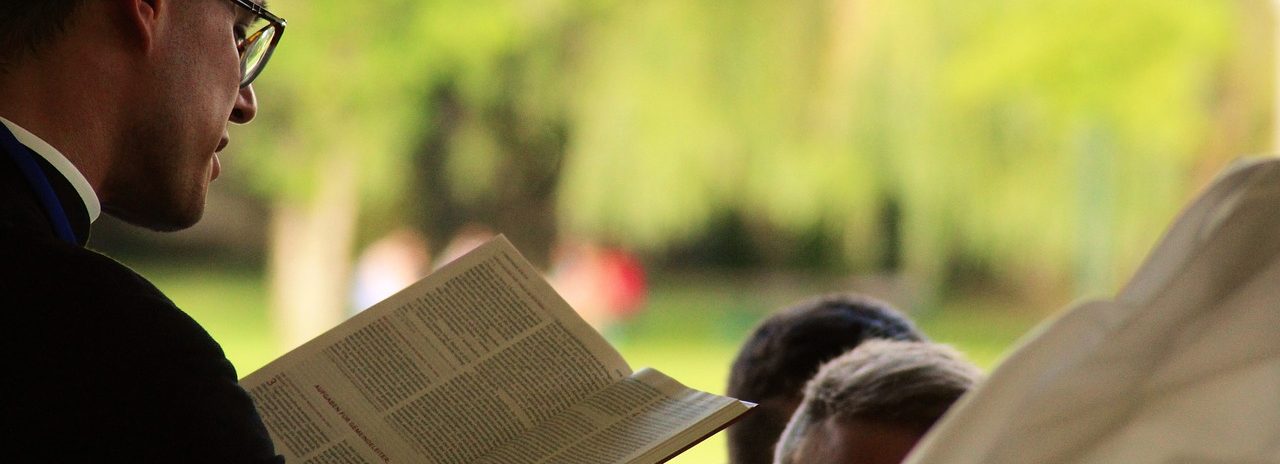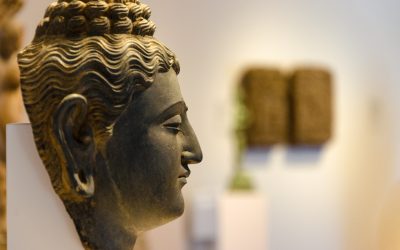This time a short article on a topic of which much more can be said. The question of who is a false Bible teacher and who is not is, of course, a very uncomfortable question. Especially when you see what the Bible says about false teachers. Peter and Jude write about this in terms that we would hardly dare to apply to anyone (see 2 Peter 2 and the Epistle of Jude).
The vast majority of Christendom holds the view that "you must not judge" and you will not soon hear a sermon on these passages. For who would dare apply the terrible things described in these passages to a "respected Bible teacher"? You can't just call any Bible teacher who has a different view of something a "false teacher." It is therefore very difficult to get the criteria of who is a false teacher from these scriptures.
Fortunately, Peter shows us the way to the Old Testament and then we find the key there.
False teacher = false prophet
Peter starts the 2th chapter with the following text:
“But there are also false prophets been among the people, as there are also among you false teachers who will secretly introduce pernicious deviations in doctrine” (2 Peter 2:1).
Here, for the false teachers on Christian property, reference is made to the false prophets who acted in Israel. That way we get to the key in Deuteronomy 13 –
“If in your midst a prophet arise or one who has dreams, and gives you a sign or a wonder, and that sign or that wonder of which he spoke to you comes and he says: Let's go after other godswhom you do not know, and let us serve them, then do not listen to the words of that prophet or to him who has those dreams! For the LORD your God put you to the test, to know whether you love the LORD your God with all your heart and with all your soul. You must go after the LORD your God; Him you must fear; you must keep His commandments and obey His voice; You must serve Him and hold fast to Him.” (Deuteronomy 13:1-4)
This section makes a number of things clear regarding the characteristics of a false prophet.
- He speaks things that can stand the test of Deuteronomy 18:21-22. What he says happens and so it is one who speaks the words of the Lord. In general you can say that this is about someone who 'speaks a word from God, who says things that you can agree with because they are biblical. But the good is always mixed with the poison by the devil and that comes after this.
- The false prophet can be distinguished by pointing the way to idolatry! This, as far as I can see, is the most important characteristic of a false prophet.
The false teacher points you to the charismatic or contemplative way
Even with today's false Bible teachers you can see that they always point their listeners in the direction of idolatry. Specifically, this means that they proclaim and recommend charismatic and/or contemplative teachings and practices as good or necessary for your spiritual life as a Christian.
In addition, they also proclaim things that you cannot always dismiss as unbiblical. But don't let the latter mislead you. The key question is always what he learns about experiencing God, about the (baptism with the) Holy Spirit, about the charismatic phenomena, and so on and so on. The intention of the false teacher is that you adopt these kinds of views and the associated practices and thus end up in the idolatry that God hates so much.
Community of people with demons
That it is also mentioned in the said chapter in the 2th Peter's letter is about false teachers who practice idolatry themselves and want to drag others into it, as can be seen from all the examples mentioned here, which all have to do with idolatry.
The chapter makes it clear that these false teachers are under the judgment of God (verses 3, 17). This is the same judgment that God has prepared for
- the angels who have sinned (verse 4). Jude verse 6 makes it clear that they are angels who had intercourse with men. See also what Genesis 6:1-5 says about this.
- the Old World; it perished in the flood (verse 4). The angels were responsible, but the people also had their own responsibility and were therefore judged. Only eight people in all the ancient world were excluded from this, who were not guilty of idolatry!
- Sodom and Gomorrah; they came under the judgment of God. That they were people who had intercourse with demons (and thus lived in idolatry) can be seen from the fact that they also wanted to do this with the angels who came to visit Lot (Genesis 19:1 et seq.).
Also the 'away from Balaam' (2:15) denotes idolatry. It was the counsel of Balaam (Numbers 31:16) that caused the Israelites to commit fornication with the Moabite women, and they subsequently fell into idolatry (Numbers 25:1-5).
We see here that the false teachers in 2 Peter 2 are emphatically associated with idolatry and therefore are rightly compared by Peter to the false prophets in the Old Testament.

Throughout the Bible the 'false prophet' (= so 'false teacher') is directly associated with the practice and propagation of idolatry, approaching God in a pagan way and ultimately experiencing 'God' physically.
They are off to a good start
It is striking how the false teachers are described in 2 Peter 2 as having started well but lost their way and then ended up in idolatry, which they subsequently condoned and promoted. Note the following expressions.
- 'the Lord has bought them' is stated in verse 2. We dispense here with the question of exactly what this means; it says that they now deny Him and bring swift destruction upon themselves.
- “They have forsaken the right way and gone astray . . .” (verse 15)
- They had “fled the defilements of the world through the knowledge of the Lord and Savior Jesus Christ . . . (verse 20)
- “They have come to know the way of righteousness . . . (verse 21)
They are people, Bible teachers who used to walk 'the right way', but at some point in their life they have experienced a great change that led them to go astray by idolatry. This is also exactly what you find with many of the charismatic and contemplative teachers. I remember Sam Storms (as an example) who somewhere tells the story that he was a true Calvinist and opponent of all charismatic teachings and practices, but through some experience is convinced by the 'charismatic truth' and has continued in that track ever since.
You come across this phenomenon with many 'bible teachers', also in the Netherlands. Not only is that remarkable, but it is exactly what the Bible tells us here in 2 Peter 2.
Are they born again?
You often hear the remark 'But they are believers, aren't they? Aren't they born again?" When we read 2 Peter 2 it says the following about their fate:
- The sentence upon them has long been in effect, and their destruction does not slumber (verse 3)
- The unjust is kept until the day of judgment to be punished (verse 9)
- They will perish in their wickedness (verse 12)
- People for whom the deepest darkness is reserved for eternity (verse 17)
My conclusion is terrible, especially since most of us know one or more of them personally. But based on what Peter writes here, I cannot say with the best will in the world that they are truly born again and children of God.
The Old Testament supports this, because with the false prophet from Deuteronomy you had to act like this:
“And that prophet . . . must be slain, because he hath called to rebel against the LORD your God, who brought you out of the land of Egypt, and redeemed you from the house of bondage; and because he would turn you from the way which the LORD your God commanded you to go in it. Thus you must put away evil from among you.” (Deuteronomy 13::5)
You had to kill him so that his evil influence was stopped and the evil was removed from the community of Israel. The same is true of the idolater (let alone the false teacher) in the Christian congregation; you should not literally kill him, of course, but you can no longer practice Christian fellowship with him (1 Corinthians 5:11,12). You must withdraw from his influence and you can no longer call such a person a 'brother'.
Is it tough?
If you ask me if this isn't very hard, I agree. For us humans, with our feelings, this is a harsh view. But it is God's view: idolatry, fellowship with Satan's demons (and then also thinking that you 'experience God') is the worst thing we can do to Him. He calls it a 'crime' and 'hate him' (Exodus 20:5).
Idolatry is the worst sin a Christian can commit and if we don't distance ourselves from it (including those who practice and propagate it) sooner or later we will go down the same path.
It was no wonder that 2 Peter 2:2 says “And many will follow them (the false teachers) . . . in their pernicious ways”. Today many go this way and follow their false teachers on the way of charismata or of contemplation[1].
To save us to the end, God's Word is so harsh in its sayings: that we might attract them and listen to them:
“You must go after the LORD your God; Him you must fear; you must keep His commandments and obey His voice; You must serve Him and hold fast to Him” (Deuteronomy 13:4).
An encouragement
Yet there is another great and positive encouragement in this gloomy chapter in 2 Peter. When we see that everything around us goes the way of Balaam and ends up in idolatry, then for those who want to cling to the Lord (see above text from Deuteronomy 13:4) there is still the encouragement that
“(…) even now the Lord knows how to deliver the godly from temptation . . .” (2 Peter 2:9),
just as He has preserved and redeemed Noah and his and even Lot and his family (verses 5 and 7).
“Therefore, brethren, be all the more zealous to make your calling and election sure; for if you do, you will never stumble again. For thus shall the entrance be given to you in abundance into the everlasting kingdom of our Lord and Savior Jesus Christ” (2 Peter 1:10,11)
——————————————————————-
[1] On the basis of this current article, try to find some examples of 'false teachers' in the Netherlands.



